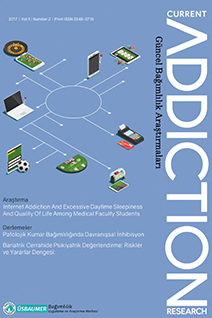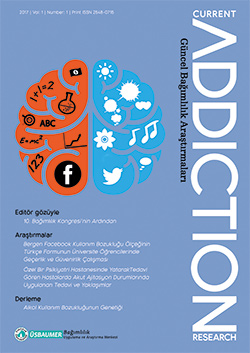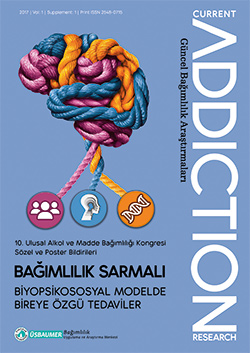ARTICLES
Review Article
Rüstem Mustafaoğlu
2019, 3(1), s:5-10
e-Sports become a part of our modern sport as it has entered our agenda in recent years, its popularity has increased rapidly and its mass of followers consists of young generation has reached a huge budget. In this review, the definition of e-Sport, historical development process, place in the world and our country, the spiritual and physical positive and negative effects on the individuals has been mentioned. Finally, it was mentioned about ergonomic changes and practical exercise suggestions to prevent possible musculoskeletal problems in e-Sport players. Scientific studies about e-Sports in Turkey is limited compared to other countries. With this study, it is aimed to eliminate the lack of Turkish resources related to this field which is developing day by day, to share the findings with the related health professionals and to contribute to the literature.
Original Article
Comparison of the Attachment Styles of Cigarette Smokers and Nonsmokers
Beyza Yaz,Hüseyin Ünübol,Gökben Hızlı Sayar
2019, 3(1), s:11-15
Aim: This study aimed to compare the attachment styles of smokers and nonsmokers.
Methods: 2800 individuals who participated in the study were given sociodemographic form and “Experiences in Close Relationships Scale”.
Results: Younger ages, male sex, low educational levels found to be related to smoking status. However smoking status or the number of daily smoked cigarettes not found to be related to attachment style.
Conclusion: According to the results of the study, attachment styles were not significantly different according to smoking status. The results of this study suggest that the other comorbid psychopathologies might be a more important risk factor than attachment style in smoking.
Original Article
Haydar Hoşgör,Derya Gündüz Hoşgör
2019, 3(1), s:16-24
Objective: The aim of this study is to examine the effect of the fear of missing out on the nomophobia, and to determine whether differences between these variables and demographic features.
Method: In accordance with this purpose, the students who were studying at the Department of Health Management in 2017-2018 autumn semester at universities in Istanbul were included in this study and data of 273 respondent were evaluated. Personal information form and FoMO and Nomophobia scales were used for data collection. Descriptive statistics, t-test, correlation and regression analyses were used in the data analysis.
Results: According to the analysis outcomes, the levels of nomophobia and FoMO of the students are above average. The results of the study demonstrate that there is a significant relation at a moderate level and positive direct relationship between nomophobia and fear of missing out, as well as the fear of missing out explains 30% of nomophobia. Also, the results show that there are statistically significant differences between students’ levels of nomophobia and fear of missing out, and their demographic features. Moreover, these differences are stem from students who control his smartphone at least 33 times a day, carry a continuous charger, control his smartphone as soon as waking up, connect to the social media via the smartphone.
Conclusion: It has been concluded that for future healthcare manager candidates, the fear of missing out on social networks is a predictor of nomophobia, also known as the fear of being deprived of the smartphone.
Review Article
Sever Yıldırım,Türker Tekin Ergüzel,Gökben Hızlı Sayar
2019, 3(1), s:25-30
Nowadays most of the young generation use internet intensively. These individuals are constantly online thanks to their smart phones. Since internet has a usage area that is so wide and smart phones give their users very easy access to it, many people feel desire to use smart phones. Smart phones come in many different price ranges and they are accessible for every consumer type. Many advertisements are being made to spread internet usage and make it a regular thing of everyday life. Also, smart phone companies produce more affordable phones. Smart phones make possible many useful tasks on internet for their users, such as; banking transactions, grocery shopping, watching movies and reading newspapers. Smart phones make everyday life easier and they make computer tasks without the need of using a computer; which also saves time. Purpose of this review is to overview the current situation about smart phone addiction and discuss the causes and results of this addiction.
Review Article
Sociology of Consumption: A Study on Technology Addiction
Aybüke Kaplan
2019, 3(1), s:31-41
Technological development and diversification of products offered to the consumer and make them attractive cause some problems. The main reason for these problems is the inability to control the product life. Uncontrolled use of technology leads to many behavioral addictions. Technology addiction, which is accepted as a sub-dimension in behavioral addiction, is a prominent problem in this process. It has been found that people’s increasing dependence on technology changes individuals identity and, moreover, their consumption preferences. In adolescence, more dominant individuals can express themselves while expressing materialist attitude. Therefore, it is thought that the way individuals express themselves in the community is indexed to the goods they consume. For example, the element that is the main determinant of many personal oriented preference perceptions, such as the preferred phone brand and the features of the computer, is focused on what the individual consumes or adopts. In this article, the reason of the intense demand of individuals for the need created for media and communication tools and technological products is explained. In addition, technology dependence is examined from a sociological point of view in this context in which ostentatious consumption manifests itself today.



 2. Sayı
2. Sayı
 1. Sayı
1. Sayı
 Ek Sayı
Ek Sayı







